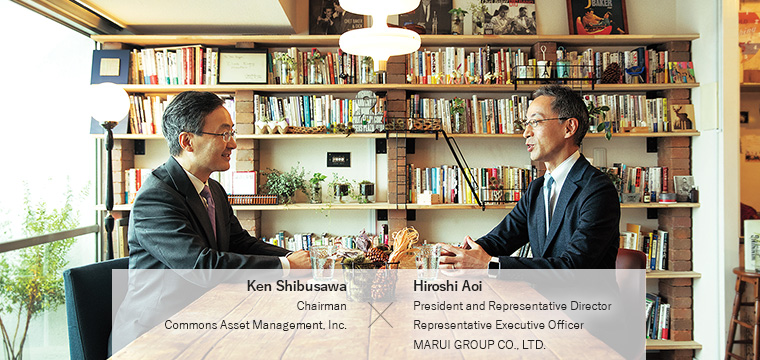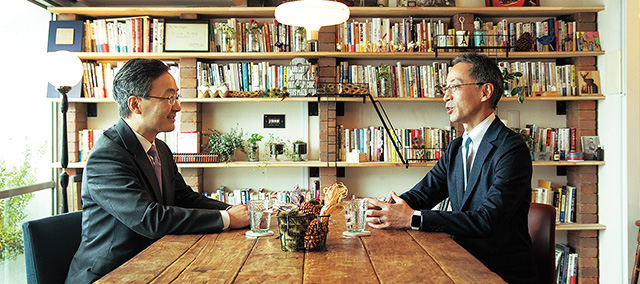
 Co-Creation, All Customers,
Co-Creation, All Customers,
Inclusion, and Happiness


-
- Ken Shibusawa
- Chairman
Commons Asset Management, Inc.
-
- Hiroshi Aoi
- President and Representative Director
Representative Executive Officer
MARUI GROUP CO., LTD.
MARUI GROUP's vision is for a flourishing and inclusive society in which happiness is available to all. It is not enough for only certain people to prosper. Society cannot be said tobe flourishing if all people do not experience prosperity. The following is a discussion between Ken Shibusawa, a long-term investor and chairman of Commons Asset Management, Inc., a company that has fully embraced the concept of inclusion, and MARUI GROUP President Hiroshi Aoi during which they talk of the new potential brought about by the perspective of inclusion.
Sustainability in Business Realized through Inclusion
Aoi: MARUI GROUP's sustainability management is based on four core themes and linked to the principles of the United Nations Sustainable Development Goals. Among the core themes are customer diversity and inclusion and, on an internal basis, workplace inclusion. In this manner, inclusion is a major focus for the Company. We have previously spoken of the concept of "all customers," but this concept lacked clarity. We were able to pinpoint the source of this lack of clarity when the Sustainable Development Goals put forth the idea of inclusion as incorporating everyone and leaving no one behind. This idea had the same goal as MARUI GROUP's co-creation management, which aims to expand the intersection between the interests of all stakeholders. We thus realized that "inclusion" more concisely communicated our goals than the idea of "all customers."
Shibusawa: The concept of inclusion is integral to sustainability management. I came to realize this fact when I read Rongo and Soroban ("The Analects of Confucius and Abacus") by Eiichi Shibusawa, my greatgrandfather. Eiichi Shibusawa is viewed as the father of capitalism in Japan and is known to have contributed to the establishment of around 500 companies and 600 universities, hospitals, and social welfare institutions. In a chapter on rational management in Rongo and Soroban, he describes the idea that, no matter how rich a manager may become, the happiness this wealth grants will be fleeting if a large portion of society falls into poverty as a result. This idea is the same as the concept of sustainability, which it would seem, existed even 100 years ago.
Aoi: In the past, MARUI GROUP's business succeeded by focusing on younger generations. After the turn of the century, however, the operating environment underwent drastic change, and it became clear that continuing to focus only on products for younger generations would result in an unsustainable business and invite risks. This realization notwithstanding, our past successes had caused us to become trapped by a sense of identity that associated MARUI GROUP with younger generations, and we were unable to break away. The chance to escape this predicament came with the opening of a new store in front of Yurakucho Station in Tokyo, which took place around that time. Yurakucho is an area frequented by people of all ages, meaning that this new Marui would have to win the support of both younger and older generations. This was what inspired us to broaden our focus from younger generations to all ages.
Shibusawa: This ability to evolve together with the changing operating environment illustrates MARUI GROUP's affinity with sustainability.
Aoi: This change brought about increases in both customers and earnings. Our next step was to expand the range of sizes we offered. A prime example of these efforts can be seen in shoes. Previously, shoes had only been available in sizes near the middle of the bell curve, and shoes were not offered for foot sizes that deviated too far from the average foot size. People with such foot sizes therefore could not find the shoes they sought, forcing them to pay exorbitant amounts for custom-made shoes or to wear sneakers despite wanting high heels. This situation deprived specific groups of people of certain benefits of society. It is often said that the number of customers is declining due to a shrinking population. However, from the perspective of inclusion, we will see that many potential customers are, in fact, being left behind. This realization led us to work to include such individuals, which in turn drove the growth of our business. In this manner, the direction of our business strategies coincided with the resolution of social issues from an inclusion standpoint.
Danger of Eradicating Inconsistency and Inefficiency
Shibusawa: There are two schools of thought with regard to efficiency. One is a mechanical approach that sees value as being born from efficiency and rationality. Throughout my career in the investment world, I have used this approach, believing the increased efficiency is certain to generate corporate value. However, blindly pursuing efficiency without entertaining new possibilities bears the risk of excluding exciting new ideas. The other school of thought sees life as inherently inconsistent and inefficient, presenting the possibility of new discoveries arising out of inefficiency. Innovation is at times the process of taking something that initially seemed to be inconsistent or inefficient and linking it to a new vision for the world to create something never seen before. For this reason, it is dangerous to attempt to eradicate all inconsistency and inefficiency from the world. This idea was in part behind my establishment of Commons Asset Management.
Aoi: A company is not like a machine, but is rather driven by people and is therefore like a living organism. Moreover, companies are not sustained exclusively by their employees, but are rather supported by entire ecosystems comprising their various stakeholders. In other words, a company is a place that is formed by various organic relationships.
Shibusawa: People sometimes speak of two different types of power. One is the power to increase efficiency. Although this power is necessary, it can only be exhibited in comparison to things that already exist and therefore cannot give birth to something completely new. The other type of power is the power to create new things, sometimes by incorporating inconsistency. There cannot be true progress without this power. The idea of co-creation is also linked to this type of power. I therefore think this is a concept that requires more attention.
Aoi: You speak of the idea of focusing on "ands" versus "ors." Inconsistency is one of the fundamental reasons why engagement is important. Two people will no doubt have differing views, making ideas appear in terms of "ors." Focusing only on these differences or inconsistencies will make one unable to see the similarities in their views. However, if we change our perspective, we will certainly find similarities or shared aspects?the "ands" of their views. At MARUI GROUP, we see corporate value as building upon these "ands."
Shibusawa: MARUI GROUP describes corporate value as arising from the intersection of five rings of stakeholders. I see these rings as having elasticity. Engagement is what moves these rings. If this movement can be directed toward the center of the intersection, the intersection between the interests of these stakeholders will no doubt grow larger. Accordingly, while it may be possible to entrust the efficiency-increasing power to the organization, the creating power, the power that goes beyond judging current situations to foresee the future, must be the power of management.
Necessity of Inclusion for Future Generations
Aoi: Around New Year's 2017, I watched an interview with people who had just reached adulthood in which they were asked about their resolutions for that year, and the responses were quite shocking. Around 70% of the questioned individuals expressed concern for the future and in relation to money. Not knowing exactly how to address these concerns, they would resort to conservation and saving. Perhaps better than these options would be the approach of making gradual, cumulative investments to save and increase one's money with time. This interview reinforced the idea that it was our mission to inform young adults of this approach.
Shibusawa: Saving money for the future is a prudent decision. However, the annual interest rate offered on bank deposits is only 0.002% in Japan. This means that if one were to save ¥10,000, roughly U.S.$100, over 20 years, the 0.002% interest rate would result in it only growing to ¥10,020. In this manner, saving alone cannot produce sufficient results. Conversely, the annual growth rate of 3% in the global population suggests that the base growth of the global economy will be about 3% each year. A service that will take advantage of this fact is Tsumitate NISA, which is slated for launch in January 2018. This service provides tax exempt dividends and transfer gains over a 20-year period. While the maximum amount that can be invested in a year is ¥400,000, which may seem a bit low, this equates to ¥33,333 a month, a level that is sufficient for investments conducted as part of normal life. After 20 years, it is likely that the amount returned will be substantially larger than the collective principal of ¥8,000,000 invested over this period. If one were to start investing in their 20s, they would have accumulated a substantial amount of assets by the time they were in their 40s. I hope that younger people will catch on to this fact as soon as possible. While it is important to be satisfied with what one has, it is equally important to understand what necessities one lacks. MARUI GROUP is poised to build upon this concept by introducing the new perspective of retailing in financial services.
Aoi: MARUI GROUP has long been engaged in retail. Looking back, I realize that it was the joy brought about by earning the gratitude of customers that has been our source of motivation. We have thus responded to the various changes society has undergone by considering what services would bring the greatest joy to our customers at any given time. Examining what services we can best provide, we have sometimes been led to start from zero. Our business has changed as a result. We are now rapidly transitioning to a real estate model; our stores are transforming into showroom-type spaces or sources of new experiences and venues for consulting; and our methods of distributing products are increasingly using an e-commerce approach. Nevertheless, our connection with customers is still retail in nature. However, the definition of "retail" is changing for MARUI GROUP. This new definition of "retail" goes beyond selling products to include the provision of retail finance and other financial and non-financial services.
Shibusawa: That is truly an example of the creating power behind co-creation. I am confident in MARUI GROUP's ability to create new innovations by incorporating the power of different fields. The word "invest" comes from the Latin word "investire," which means "to clothe in, cover, or surround." In this manner, investment is not simply about sinking funds into something, but is rather about surrounding oneself with various types of growth and perspectives. Based on this idea, I hope to open the eyes of people who have only ever seen investment in the traditional sense and help them see how anyone can easily invest to accumulate the assets that will help them in their future.
Ken Shibusawa
Chairman, Commons Asset Management, Inc.
Executive Director, Shibusawa Eiichi Memorial Foundation
Director, Keizai Doyukai
After working at a foundation operating in the field of international relations, Ken Shibusawa acquired a Master of Business Administration in the United States and then joined the financial industry. Working at foreign financial institutions in Japan, he was involved in the dealing of Japanese government bonds and currency options and the sale of derivatives. He also held a position as the Japanese representative of a major U.S. hedge fund. Mr. Shibusawa struck out on his own in 2001, later establishing the current Commons Asset Management in 2007 and becoming its chairman in 2008.
Stakeholder Engagement
This sustainability website is designed to accommodate people with color blindness.







